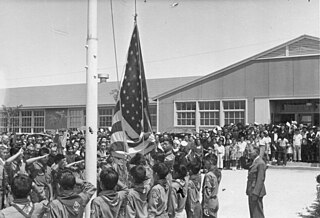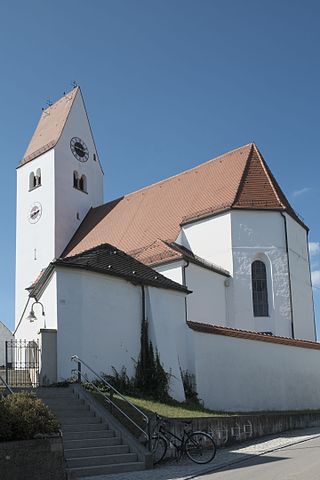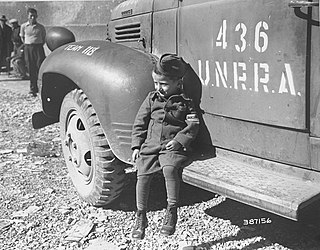Related Research Articles

During the early years of World War II, Japanese Americans were forcibly relocated from their homes on the West Coast because military leaders and public opinion combined to fan unproven fears of sabotage. As the war progressed, many of the young Nisei, Japanese immigrants' children who were born with American citizenship, volunteered or were drafted to serve in the United States military. Japanese Americans served in all the branches of the United States Armed Forces, including the United States Merchant Marine. An estimated 33,000 Japanese Americans served in the U.S. military during World War II, of which 20,000 joined the Army. Approximately 800 were killed in action.

Buchenwald was a Nazi concentration camp established on Ettersberg hill near Weimar, Germany, in July 1937. It was one of the first and the largest of the concentration camps within the Altreich. Many actual or suspected communists were among the first internees.

Dachau was one of the first concentration camps built by Nazi Germany and the longest running one, opening on 22 March 1933. The camp was initially intended to intern Hitler's political opponents, which consisted of communists, social democrats, and other dissidents. It is located on the grounds of an abandoned munitions factory northeast of the medieval town of Dachau, about 16 km (10 mi) northwest of Munich in the state of Bavaria, in southern Germany. After its opening by Heinrich Himmler, its purpose was enlarged to include forced labor, and eventually, the imprisonment of Jews, Romani, German and Austrian criminals, and, finally, foreign nationals from countries that Germany occupied or invaded. The Dachau camp system grew to include nearly 100 sub-camps, which were mostly work camps or Arbeitskommandos, and were located throughout southern Germany and Austria. The main camp was liberated by U.S. forces on 29 April 1945.

The 20th Armored Division was an armored division of the United States Army that fought in World War II. It was activated on 15 March 1943 at Camp Campbell in Kentucky.

Nazi concentration camp badges, primarily triangles, were part of the system of identification in German camps. They were used in the concentration camps in the German-occupied countries to identify the reason the prisoners had been placed there. The triangles were made of fabric and were sewn on jackets and trousers of the prisoners. These mandatory badges of shame had specific meanings indicated by their colour and shape. Such emblems helped guards assign tasks to the detainees. For example, a guard at a glance could see if someone was a convicted criminal and thus likely of a tough temperament suitable for kapo duty.

The 71st Infantry Division was a unit of the United States Army in World War II.

Gęsiówka is the colloquial Polish name for a prison that once existed on Gęsia ("Goose") Street in Warsaw, Poland, and which, under German occupation during World War II, became a Nazi concentration camp.

During the Dachau liberation reprisals, German SS troops were killed by U.S. soldiers and concentration camp prisoners at the Dachau concentration camp on April 29, 1945, during World War II. It is unclear how many SS guards were killed in the incident, but most estimates place the number killed at around 35–50. In the days before the camp's liberation, SS guards at the camp had forced 7,000 inmates on a death march that resulted in the death of many from exposure and shooting. When Allied soldiers liberated Dachau, they were variously shocked, horrified, disturbed, and angered at finding the massed corpses of prisoners, and by the combativeness of some of the remaining guards who allegedly fired on them.
The New York Guardian was a monthly periodical published by Herbert London, a professor at New York University and the 1990 Conservative Party candidate for governor of New York State. The paper's editor-in-chief was Christopher W. Ruddy.

The 761st Tank Battalion was an independent tank battalion of the United States Army during World War II. Its ranks primarily consisted of African American soldiers, who by War Department policy were not permitted to serve in the same units as White troops; the United States Armed Forces did not officially desegregate until after World War II. The 761st were known as the Black Panthers after their distinctive unit insignia, which featured a black panther's head, and the unit's motto was "Come out fighting". Decades after the war, the unit received a Presidential Unit Citation for its actions. In addition, a large number of individual members also received medals, including one Medal of Honor, eleven Silver Stars and approximately 300 Purple Hearts.

Ruben Rivers was a United States Army staff sergeant who was killed in action while serving as a tank company platoon sergeant during World War II. In 1997, he was awarded the Medal of Honor, the nation's highest military decoration for valor, for his actions on November 16–19, 1944, near Bourgaltroff, France.

Gunskirchen is a town in the Austrian state of Upper Austria.

Felix Laurence Sparks was an American attorney, government official, and military officer from Colorado. A veteran of World War II, he attained the rank of brigadier general in the Colorado Army National Guard and received the Silver Star and the Purple Heart. Sparks also served as District Attorney of Colorado's 7th Judicial District, an Associate Justice of the Colorado Supreme Court, and the longtime director of the Colorado Water Conservation Board.
Leon Bass was an educator from Philadelphia. He is noted as an African-American soldier in World War II who witnessed the Buchenwald concentration camp.

Hurlach is a municipality in the district of Landsberg in Bavaria in Germany.
Paul Levern Bates was a United States Army officer. He served a distinguished and decorated career in the Army, which most notably included commanding the first black tank battalion to enter combat in World War II. He also became well known as the white colonel who refused to court-martial future Baseball Hall of Famer Jackie Robinson.
William Miles was an American filmmaker. Born in Harlem, New York, he used his deep knowledge and experience of that iconic neighborhood to produce films that tell unique and often inspiring stories of Harlem's history. Based at Thirteen/WNET in New York City, William Miles produced many films dedicated to the African-American experience that have been broadcast nationwide.

Joseph Schleifstein is a Polish-born American who survived the Buchenwald concentration camp during the Holocaust at the age of four. He was hidden by his father in a large sack, enabling him to avoid detection by SS guards when arriving at the camp. Other prisoners helped his father keep him hidden and Schleifstein survived until the Americans liberated the camp. After World War II, Schleifstein and his parents emigrated to the United States. He did not discuss his wartime experiences for decades, even with his children. His case gained publicity in 1999 with the anniversary of the 1997 movie Life is Beautiful; it was discovered Schleifstein's story was an inspiration for the script. This led to a search for him and an eventual newspaper interview.
Nina Rosenblum is an American documentary film and television producer and director and member of the Academy of Motion Picture Arts and Sciences and the Directors Guild of America. Italian Fotoleggendo magazine said Rosenblum “is known in the United States as one of the most important directors of the investigative documentary”.
Season five of the television program American Experience originally aired on the PBS network in the United States on September 20, 1992 and concluded on March 1, 1993. This is the fifth season to feature David McCullough as the host. The season contained 12 new episodes and began with the first part of The Kennedys film, "The Father, 1900–1961".
References
- ↑ "Oscars Ceremonies The 65th Academy Awards 1993". The Academy of Motion Picture Arts and Sciences (AMPAS). Retrieved November 20, 2020.
- ↑ Treaster, Joseph B. (February 12, 1993). "Film Halted on Blacks Freeing Jews". The New York Times.
- ↑ Richard Bernstein (March 1, 1993). "Doubts Mar PBS Film of Black Army Unit". New York Times. Retrieved November 20, 2020.
- ↑ Price, Clement Alexander (1994). "Black soldiers in two world wars: 'Men of Bronze' (1980) and 'Liberators' (1992)". Historical Journal of Film, Radio and Television. 14 (4): 469. doi:10.1080/01439689400260341.
- ↑ Treaster, Joseph B. (September 8, 1993). "WNET Inquiry Finds No Proof Black Unit Freed 2 Nazi Camps". The New York Times. Retrieved November 20, 2020.
- ↑ Schulte, Mark (February 24, 2013). "Ceremony Marks 20 Years Since Oscar Nominated Sham". Times of Israel. Retrieved November 20, 2020.
- ↑ Perlman, Elliot (February 1, 2012). "Race and the liberation of Dachau". Los Angeles Times . Retrieved November 20, 2020.
- ↑ Finkle, Lee (December 1993). "Liberators—Fighting on Two Fronts in World War II. Prod. by William Miles and Nina Rosenblum. Miles Educational Film Production, 1992. 90 mins. (Direct Cinema, P.O. Box 10003, Santa Monica, CA 90410-9003)". The Journal of American History. 80 (3): 1192–1193. doi:10.2307/2080582. JSTOR 2080582.
- ↑ "The Liberators: Fighting on Two Fronts in World War II". Facing History. Retrieved October 3, 2019.
- ↑ "Potter, Lou, William Miles, and Nina Rosenblum. Liberators: Fighting on Two Fronts in World War II. New York: Harcourt Brace Jovanovich, 1992" . Retrieved October 3, 2019.